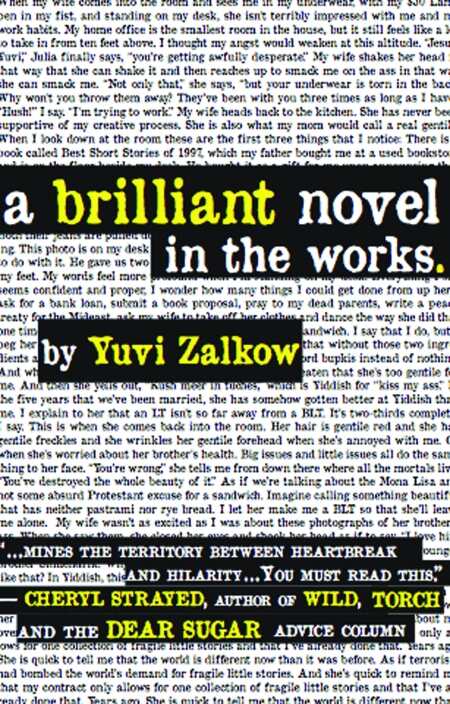A Brilliant Novel in the Works
I know! Let’s write a novel about nothing! Nothing? Nothin’. Zilch. Bupkis.
If that sounds familiar, it is. As fans of Seinfeld can attest, it’s a great setup—as long as you can pull it off. Whether the author/hero of this novel does is debatable. Many may find the whiny humor and deceptive banality of A Brilliant Novel in the Works amusing, while others might find it tiresome. Even the narrator (a.k.a. the novelist) himself feels terrible that he can’t keep one coherent thought in his head. He calls his own novel “a steaming pile of personal essays with no plot except one about an author who has no idea how to write a novel.”
A Brilliant Novel in the Works is a pastiche. As the narrator says, “I use the approach of having no approach.” This allows him to digress at will into italicized flights of fancy or flashbacks that his editor tells him “to avoid like a gastrointestinal plague.” He’s too self-absorbed to see anything around him. He obsesses that his wife is sick of him and wants him to be different than “the me that I am.”
And just who is he?
A self-described “scrawny little Jew who writes scrawny little stories.” Like the author, he lives in Portland, Oregon. (The author’s website says he’s “a novelist, failed writer, schmo,” though Yuvi Zalkow has published stories in Glimmer Train, Narrative magazine, and others. This is his first novel.)
At best, the narrator of A Brilliant Novel in the Works is fragile and sensitive; at worst, he is inadequate and unloved. As he says at one point, “somehow everything feels like my fault and I want to be punished for it all.” When his writing isn’t going well, he picks up a razor to cut himself on the ass so that he feels the burn of his own cowardice.
This is the kind of novel where fiction and life overlap. Where characters get to object to being “an ethnic plot device.” Where the author does a little intentional throat clearing to tell us what’s coming: “It involves a pee pee scene, a few palindromes, several overly symbolic anagrams, sixteen clotheslines,” etc.
As Yuvi tries to bring structure to his novel, he is in danger of having his marriage fall apart. There are some great lines and poignant moments in this writing, although they tend to get buried under all the dross. If you like your fiction “One part fear, two heaping spoons of shame, stirred in a thick sauce of terror,” have I got a book for you.
Reviewed by
Trina Carter
Disclosure: This article is not an endorsement, but a review. The publisher of this book provided free copies of the book and paid a small fee to have their book reviewed by a professional reviewer. Foreword Reviews and Clarion Reviews make no guarantee that the publisher will receive a positive review. Foreword Magazine, Inc. is disclosing this in accordance with the Federal Trade Commission’s 16 CFR, Part 255.

